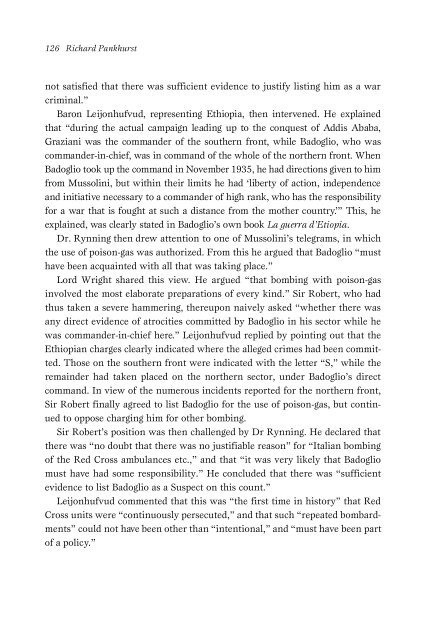Italian Fascist War Crimes in Ethiopia - Societa italiana di storia ...
Italian Fascist War Crimes in Ethiopia - Societa italiana di storia ...
Italian Fascist War Crimes in Ethiopia - Societa italiana di storia ...
You also want an ePaper? Increase the reach of your titles
YUMPU automatically turns print PDFs into web optimized ePapers that Google loves.
126 Richard Pankhurst<br />
not satisfied that there was sufficient evidence to justify list<strong>in</strong>g him as a war<br />
crim<strong>in</strong>al.”<br />
B a ron Leijonhufvud, re p resent<strong>in</strong>g <strong>Ethiopia</strong>, then <strong>in</strong>tervened. He ex p l a i n e d<br />
that “dur<strong>in</strong>g the actual campaign lead<strong>in</strong>g up to the conquest of Ad<strong>di</strong>s Ababa,<br />
G raziani was the commander of the southern front, while Badoglio, who wa s<br />
commander-<strong>in</strong>-chief, was <strong>in</strong> command of the whole of the northern front. When<br />
Badoglio took up the command <strong>in</strong> November 1935, he had <strong>di</strong>rections given to him<br />
f rom Mussol<strong>in</strong>i, but with<strong>in</strong> their limits he had ‘liberty of action, <strong>in</strong>dependence<br />
and <strong>in</strong>itiative necessary to a commander of high rank, who has the re s p o n s i b i l i t y<br />
for a war that is fought at such a <strong>di</strong>stance from the mother country.’” This, he<br />
expla<strong>in</strong>ed, was clearly stated <strong>in</strong> Badoglio’s own book La guerra d’Etiopia.<br />
Dr. Rynn<strong>in</strong>g then drew attention to one of Mussol<strong>in</strong>i’s telegrams, <strong>in</strong> which<br />
the use of poison-gas was authorized. From this he argued that Badoglio “must<br />
have been acqua<strong>in</strong>ted with all that was tak<strong>in</strong>g place.”<br />
Lord Wright shared this view. He argued “that bomb<strong>in</strong>g with poison-gas<br />
<strong>in</strong>volved the most elaborate preparations of every k<strong>in</strong>d.” Sir Robert, who had<br />
thus taken a severe hammer<strong>in</strong>g, thereupon naively asked “whether there was<br />
any <strong>di</strong>rect evidence of atrocities committed by Badoglio <strong>in</strong> his sector while he<br />
was commander-<strong>in</strong>-chief here.” Leijonhufvud replied by po<strong>in</strong>t<strong>in</strong>g out that the<br />
<strong>Ethiopia</strong>n charges clearly <strong>in</strong><strong>di</strong>cated where the alleged crimes had been committed.<br />
Those on the southern front were <strong>in</strong><strong>di</strong>cated with the letter “S,” while the<br />
rema<strong>in</strong>der had taken placed on the northern sector, under Badoglio’s <strong>di</strong>rect<br />
command. In view of the numerous <strong>in</strong>cidents reported for the northern front,<br />
Sir Robert f<strong>in</strong>ally agreed to list Badoglio for the use of poison-gas, but cont<strong>in</strong>ued<br />
to oppose charg<strong>in</strong>g him for other bomb<strong>in</strong>g.<br />
Sir Robert’s position was then challenged by Dr Rynn<strong>in</strong>g. He declared that<br />
there was “no doubt that there was no justifiable reason” for “<strong>Italian</strong> bomb<strong>in</strong>g<br />
of the Red Cross ambulances etc.,” and that “it was very likely that Badoglio<br />
must have had some responsibility.” He concluded that there was “sufficient<br />
evidence to list Badoglio as a Suspect on this count.”<br />
Leijonhufvud commented that this was “the first time <strong>in</strong> history” that Red<br />
Cross units were “cont<strong>in</strong>uously persecuted,” and that such “repeated bombardments”<br />
could not have been other than “<strong>in</strong>tentional,” and “must have been part<br />
of a policy.”

















